#AFSPA
Explore tagged Tumblr posts
Text
0 notes
Text
AFSPA can be revoked when militancy is completely over in J&K: Anurag Thakur
JAMMU — The Armed Forces (Special Powers) Act (AFSPA) can be revoked when militancy is completely over in Jammu and Kashmir, Union Minister Anurag Thakur said on Wednesday, as he highlighted a positive change in the overall security situation in the Union Territory. He was reacting to the statement of Home Minister Amit Shah that the central government will consider revoking the AFSPA in J&K. In…

View On WordPress
#AFSPA#Amit Shah#Anurag Thakur#Bharatiya Janata Party (BJP)#Jammu and Kashmir (J&K)#Kashmir#Lok Sabha Election#Politics#Security Forces
0 notes
Text
Know what is the controversial law AFSPA implemented in Assam since 1990, which Assam CM Himanta Biswa is planning to withdraw
AFSPA can be removed from Assam soon, Assam Chief Minister Himanta Biswa was addressing the Commandant’s Conference on Monday. He said the move would facilitate the deployment of Assam Police battalions in place of the Central Armed Police Forces or CAPFs. AFSPA, the controversial law in force in Assam since 1990, gives security forces the power to crack down and arrest anyone without a warrant.…
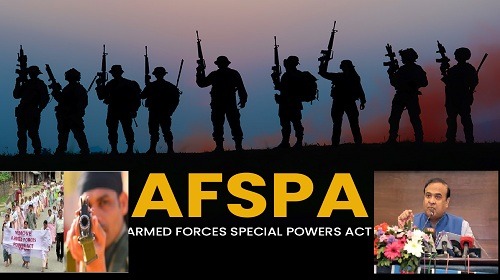
View On WordPress
#AFSPA#Assam#Assam Chief Minister#Assam Police battalions#Breaking +65News Near Me#Breaking News#breaking news app#breaking news headlines#breaking news india#breaking news now#CAPF#Central Armed Police Force#CM Himanta Biswa#Controversial law#Exclusive News#india breaking news#International Breaking News#local headlines today#remove AFSPA#Today Breaking News#Trending News
0 notes
Text

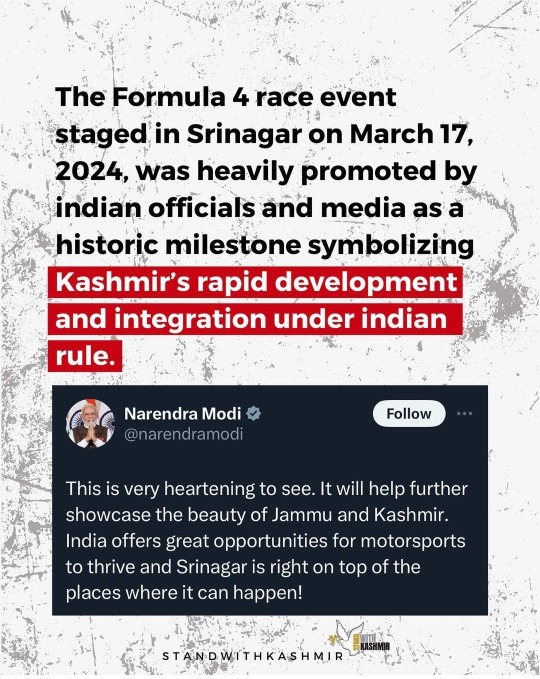
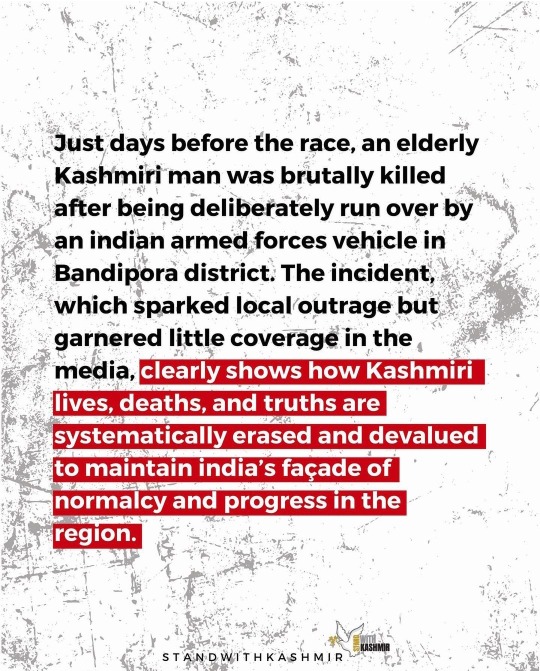
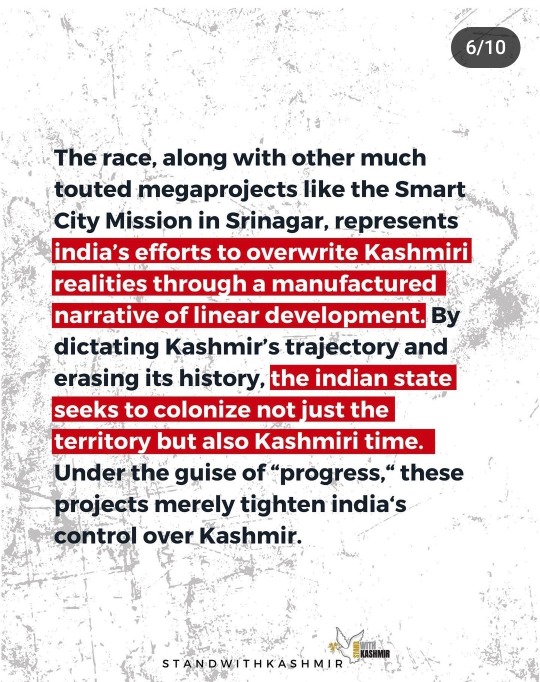

@/standwithkashmir2 on insta
#f1#not really but yeah#skipped a few slides too tired to ss them all the point remains the same#like trying to get a track in gift city aka their 'corp hub#(it looks like fake singapore plus fake dubai. and I've never been to either place yet it's so obvious 💀)#quite close to elections as well ...#what you have to know is the current govt tried to show progress through 'industrialisation'#nevermind that they illegally made the state into union territories....nvm the large military presence or afspa....#look how easy it is to be a tourist now :)
3 notes
·
View notes
Text
AFSPA removal in J&K conditional to complete return of peace: Defense Minister Rajnath Singh
AFSPA removal in J&K conditional to complete return of peace: Defense Minister Rajnath Singh Jammu, June 26 : Defence Minister Rajnath Singh on Monday said that removal of Armed Forces Special Powers Act (AFSPA) from the Union Territory of Jammu and Kashmir is conditional to complete return of peace in the region. “AFSPA will be removed from the Union Territory of J&K once complete peace…
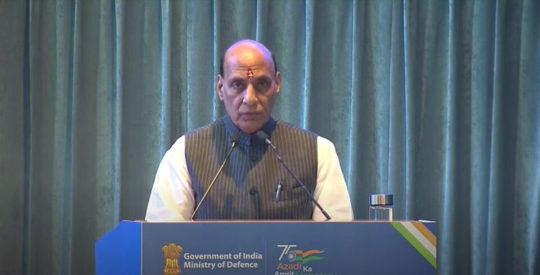
View On WordPress
0 notes
Note
In which world has India "occupied" Kashmir? Kashmir is a part of India which is severely affected by terrorist activity. Many were forced to leave their homes to settle in different parts of India (Kashmir pandits etc). How was that India's fault and not the fault of the country the terrorists came from?
Firstly, I want to make it clear that I do condemn what was done to Kashmiri Pandits. Secondly, I do believe that Kashmir is occupied (that does NOT mean that I don't understand that the geopolitical reality is complex), and that a plebiscite should have been conducted. And I believe that neither India nor Pakistan has been entirely innocent with regard to Kashmir.
My interpretation of the events described below (quoted from the linked articles), is that Kashmir is occupied. And no, they are not my only sources of information - other articles, the Kashmiri woman who came to speak at my university, and a friend of a friend who visited Kashmir and stayed there for a significant period of time (not as a tourist), are also sources of my information on Kashmir.
When India and Pakistan gained independence from British rule in 1947, the various princely rulers were able to choose which state to join. The Maharaja of Kashmir, Hari Singh, was the Hindu head of a majority Muslim state sandwiched between the two countries and could not decide. He signed an interim "standstill" agreement to maintain transport and other services with Pakistan. In October 1947 tribesmen from Pakistan invaded Kashmir, spurred by reports of attacks on Muslims and frustrated by Hari Singh's delaying tactics. The Maharaja asked for Indian military assistance. India's governor-general, Lord Mountbatten, believed peace would best be served by Kashmir's joining India on a temporary basis, pending a vote on its ultimate status. Hari Singh signed the Instrument of Accession that month, ceding control over foreign and defence policy to India. Indian troops took two-thirds of the territory, and Pakistan seized the northern remainder. China occupied eastern parts of the state in the 1950s. Whether the Instrument of Accession or the entry of Indian troops came first remains a major source of dispute between India and Pakistan. India insists that Hari Singh signed first, thereby legitimising the presence of their troops. Pakistan is adamant that the Maharaja could not have signed before the troops arrived, and that he and India had therefore ignored the "standstill" agreement with Pakistan. Pakistan demands a referendum to decide the status of Kashmir, while Delhi argues that, by voting in successive Indian state and national elections, Kashmiris have confirmed their accession to India. Pakistan cites numerous UN resolutions in favour of a UN-run referendum, while India says the Simla Agreement of 1972 binds the two countries to solve the problem on a state-to-state basis. There has been no significant movement from these positions in decades. In addition, some Kashmiris seek a third option - independence - which neither India nor Pakistan is prepared to contemplate.
The two countries fought wars over Kashmir in 1947-48 and 1965. They formalised the original ceasefire line as the Line of Control in the Simla Agreement, but this did not prevent further clashes in 1999 on the Siachen Glacier, which is beyond the Line of Control. India and Pakistan came close to war again in 2002. The situation was further complicated by an Islamist-led insurgency that broke out in 1989. India gave the army additional authority to end the insurgency under the controversial Armed Forces Special Powers Act (AFSPA). Despite occasional reviews of the AFSPA, it still remains in force in Indian-administered Jammu and Kashmir.
Today it remains one of the most militarised zones in the world. China administers parts of the territory.
Media in Indian-administered Kashmir are generally split between pro- and anti-secessionist. Local journalists work under strict curfews and also face threats from militant groups. Internet access is sporadic and text messaging services are regularly blocked.
In Pakistani-controlled Kashmir, the media are used mainly for propaganda purposes, mainly to highlight the alleged human rights violations in Indian-administered Kashmir.
Also, I think the following information is relevant too.
The Muslim majority in the princely state found the Maharaja’s reign authoritarian. In the words of Kashmiri author P.N. Bazaz, “Dogra rule has been a Hindu Raj.” Maharaja Hari Singh thought of independence because, according to American Indologist William Norman Brown, “He disliked becoming part of India, which was being democratised, or Pakistan, which was Muslim....”
On August 12, 1947, J&K petitioned India and Pakistan for a standstill agreement, which Pakistan signed but India refused, asking the Maharaja to send a representative for discussions. With every passing day, the Maharaja’s position became more precarious. As early as June 1947, about 60,000 ex-army men (mostly from Poonch) had started a no-tax campaign against the Maharaja. On August 14-15, Muslims in Poonch hoisted Pakistani flags, provoking the imposition of martial law and further angering Muslim subjects. Pakistan was sending warning notes to the Maharaja, one on August 24 reading: “Should Kashmir fail to join Pakistan, the gravest possible trouble will inevitably ensue.” The worst fears of the Dogra ruler came true when on October 22, Pakistan launched Operation Gulmarg by mobilising tribals from the North-West Frontier Province. About 2,000 tribesmen, armed with modern weaponry, raided Muzaffarabad. By the evening of October 23 they had captured Domel. Garhi and Chinari fell over the next two days. Then their main column proceeded towards Uri, and then, along the Jhelum river towards Baramulla, the entry point to Srinagar.
On October 24, Maharaja Hari Singh appealed to India for military aid to flush out the raiders. India obliged but not before the Instrument of Accession was signed on October 26. It limited India’s powers over the Valley to matters of defence, communications, and foreign affairs.
And this is from the Instrument of Accession:
Nothing in this Instrument shall be deemed to commit in any way to acceptance of any future constitution of India or to fetter my discretion to enter into agreement with the Government of India under any such future constitution.
4 notes
·
View notes
Text
@schumi-honey I'm so sorry I accidentally posted and deleted your ask 😭
Anyway, since you asked favourite Bollywood movie I'll say the jury is split between Piku (2015) and Haider (2014)


I'm only counting mainstream movies I went to the theater for and not the better indie stuff.
For a movie about an Old Man's constipation, Piku is actually a surprisingly cute movie. I'll never stop being partial to Deepika and there will never ever be another like Irrfan Khan (RIP) so that also plays into it.
I can't put into words how much I love Haider, probably one of the better adaptations of Hamlet. Superimposing the wintry Danish backdrop of the play onto the politically fraught snowy climate of Kashmir was a beautiful choice. The AFSPA conversation the movie generated was also interesting. The fact that this movie released a few months into the current BJP regime and one basically can't imagine a mainstream film of this sort anymore is crazy.
2 notes
·
View notes
Text
exactly!! its weird as fuck to be referring to a place as "switzerland" or "heaven" . what else is entitlement if you feel liek its okay to take a vacation there while ignoring the social realities? so many gross human rights abuses have happened under the AFSPA act.
and this absolutely IS the natural consequence of fetishising kashmir as some kind of paradise on earth or hindu spiritual homeland when an indian tourist's presence is quite literally built on colonial entitlement and arrogance
312 notes
·
View notes
Video
youtube
India's war crimes in Kashmir
The allegations of torture and human rights abuses by Indian security forces in Kashmir have been extensively documented by international organizations, local activists, and media reports. While I cannot include images or videos directly, the following synthesis draws from verified accounts and reports to outline the patterns and incidents described:
1. Allegations of Systematic Torture and Abuse
Numerous reports detail the use of torture by Indian security forces in Kashmir, including electric shocks, beatings, sexual violence, and psychological coercion. For instance:
Electric Shocks and Physical Torture: Victims like Abid Khan (2024) described being stripped, hung from poles, and subjected to electric shocks in army camps, with injuries documented in medical records 11. Similar accounts from 2023 involve civilians detained after rebel attacks being tortured with chili powder applied to wounds and electrocution 57.
Sexualized Violence: Survivors reported threats of sexual assault, including the use of heated rods near genitals and forced nudity, aimed at instilling fear and extracting confessions 11.
Psychological Torture: Detainees were waterboarded, deprived of sleep, and forced to stare at the sun for hours, as described in testimonies from Shopian and Poonch districts 119.
2. Custodial Deaths and Impunity
Multiple cases highlight deaths in custody and the lack of accountability under laws like the Armed Forces Special Powers Act (AFSPA):
2023 Poonch Killings: Three civilians died after being detained by the army following a rebel ambush. Families reported severe torture marks on the bodies, and videos of abuse circulated online before internet shutdowns were imposed 579.
2020 Rajouri Fake Encounter: The army initially claimed to kill "Pakistani terrorists," but investigations revealed the victims were local laborers. An officer was sentenced but later had his punishment suspended, showcasing systemic impunity 79.
Historical Context: The 1991 Kunan Poshpora mass rape case involved allegations against the Indian Army, though official inquiries dismissed them as "hoaxes." Human Rights Watch, however, estimated over 100 victims 4.
3. Legal Framework Enabling Abuse
The AFSPA grants security forces immunity from prosecution without federal approval, creating a culture of impunity:
No Prosecutions: Despite thousands of abuse allegations, fewer than 1% of cases result in disciplinary action, per Indian Army claims 4. Military tribunals often overturn convictions, as seen in the 2020 Rajouri case 7.
Medical Neutrality Violations: Army personnel have infiltrated hospitals, intimidating staff and removing patients, as reported in the 1990s 6.
4. International and Local Documentation
UN and Amnesty International: Reports condemn India’s use of AFSPA and note systemic torture, enforced disappearances, and extrajudicial killings 46. A 2022 Amnesty report cited 60+ human rights violations post-2019 autonomy revocation 4.
Local NGOs: The Jammu and Kashmir Coalition of Civil Society (JKCCS) and Association of Parents of Disappeared Persons (APDP) have cataloged abuses, including sexualized torture and forced confessions 11.
5. Government Denials and Counterclaims
Indian authorities routinely dismiss allegations as "fake" or "motivated," citing counterterrorism needs. For example:
The army denied involvement in the 2023 Poonch deaths, calling them "under investigation" 7.
Officials often blame Pakistan for inciting violence, a claim rejected by Kashmiris and international observers 10.
Conclusion
While the Indian government denies systematic abuse, extensive evidence from survivors, NGOs, and international bodies points to entrenched patterns of torture and impunity in Kashmir. The AFSPA and restricted media access exacerbate these issues, leaving many cases unresolved. For further details, refer to reports by Human Rights Watch 6, Amnesty International 4, and Al Jazeera’s investigations 59.
0 notes
Video
youtube
Murshidabad violence: Bengal में जहां AFSPA लगाने की है मांग, वहां कितने...
0 notes
Text
N N Vohra welcomes Shah's statement on troops withdrawal, AFSPA
NEW DELHI — Former governor of Jammu and Kashmir N N Vohra on Wednesday hailed Union Home Minister Amit Shah’s statement that the Centre plans to pull back troops from the Union Territory and leave law and order to the police there. Vohra also welcomed Shah’s intention to revoke the Armed Forces (Special Powers) Act (AFSPA) from Jammu and Kashmir. He hoped that the government would follow a…

View On WordPress
#AFSPA#Amit Shah#J&K Governor#Jammu and Kashmir (J&K)#Kashmir#N N Vohra#Politics#Security Forces
0 notes
Text
जानिए क्या है 1990 से असम में लागु AFSPA, जिसे वापस लेने का प्लान बना रहे असम के सीएम
1990 से असम में लागु विवादास्पद कानून AFSPA सुरक्षा बलों को कार्रवाई करने और बिना वारंट के किसी को भी गिरफ्तार करने का अधिकार देता है। इसके अलावा, किसी की गोली मारकर हत्या कर देने पर यह कानून सुरक्षा बलों को गिरफ्तारी और मुकदमे से छूट देता है। असम को नवंबर, 1990 में AFSPA के तहत अशांत क्षेत्र घोषित किया गया था। तभी से इसे हर छह महीने में बढ़ाया जाता रहा है। मुख्यमंत्री सरमा सोमवार को कमांडेंट…
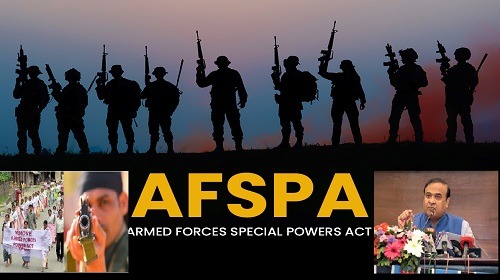
View On WordPress
#AFSPA#Assam#Assam Chief Minister#Assam Police battalions#Breaking News#breaking news app#breaking news headlines#breaking news india#breaking news now#CAPF#Central Armed Police Force#CM Himanta Biswa#Controversial law#Exclusive News#india breaking news#International Breaking News#local headlines today#remove AFSPA#Today Breaking News#Trending News
0 notes
Text
AFSPA extended in Manipur, parts of Nagaland, Arunachal
New Delhi: The Armed Forces (Special Powers) Act, which gives armed forces operating in disturbed areas sweeping powers and immunity from prosecution unless approved by the Centre, was Sunday extended for six months in entire Manipur, except the jurisdictions of 13 police stations, in view of the law and order situation there. The AFSPA, under which a particular state or some areas are declared…
0 notes
Text
Afspa extended in Manipur, Nagaland, and Arunachal for six months: MHA | India News
NEW DELHI: The ministry of home affairs (MHA) on Sunday extended the Armed Forces (Special Powers) Act (AFSPA) across Manipur, except for 13 police station areas, for another six months due to the prevailing law and order situation. The Act has also been extended in eight districts of Nagaland and 21 police station areas in five other districts, as well as in three districts of Arunachal Pradesh…
0 notes